
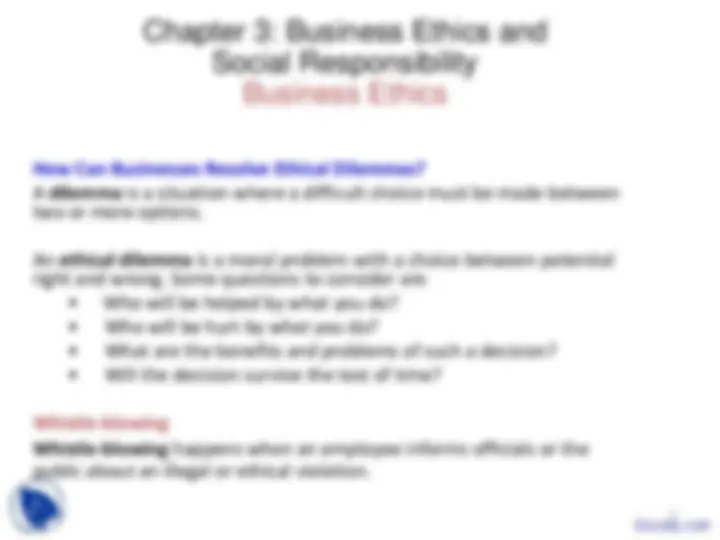
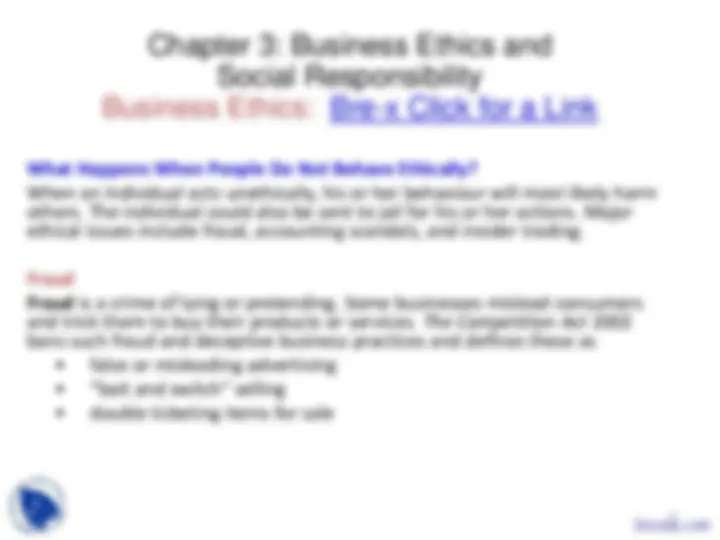
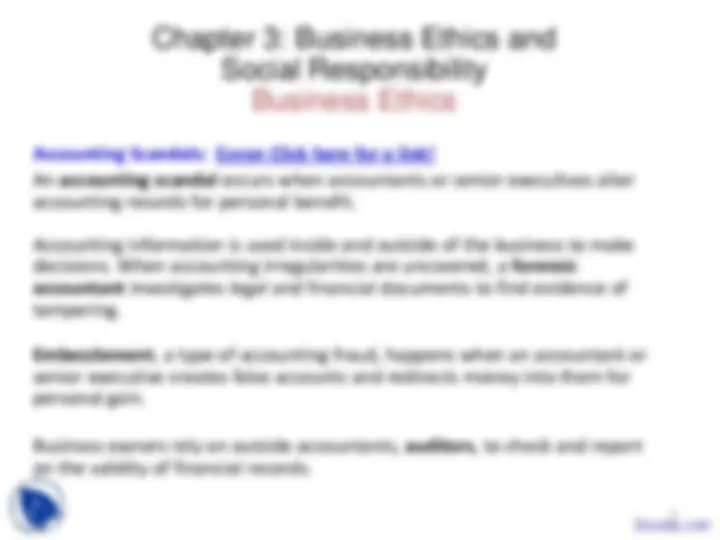

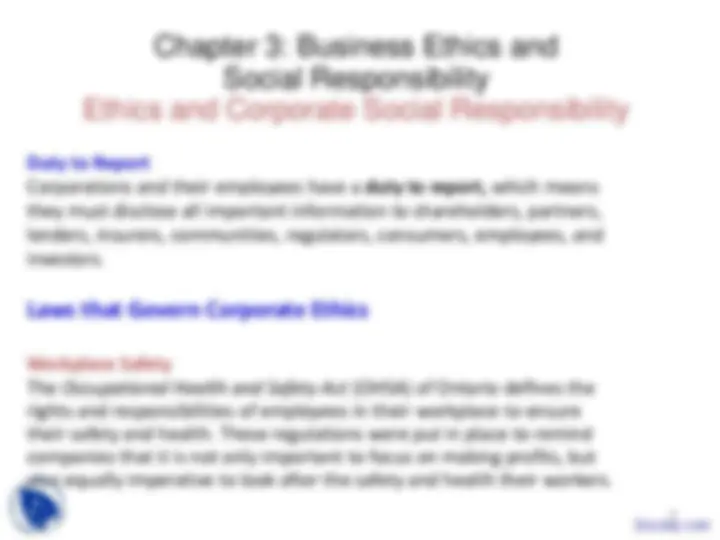
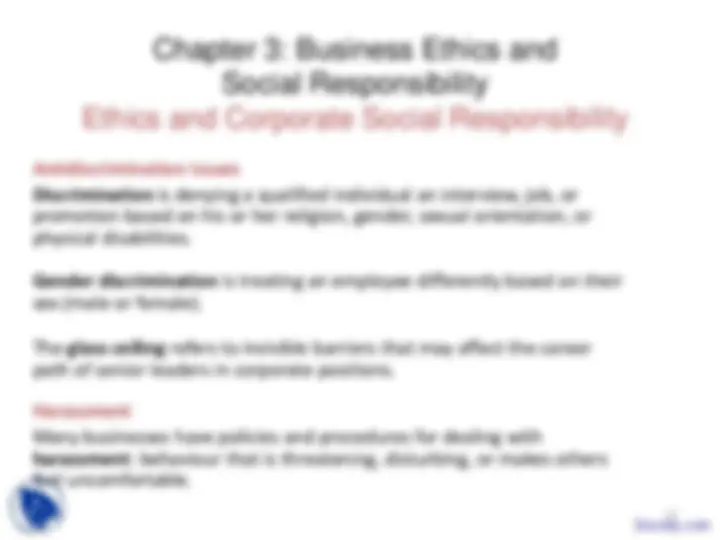
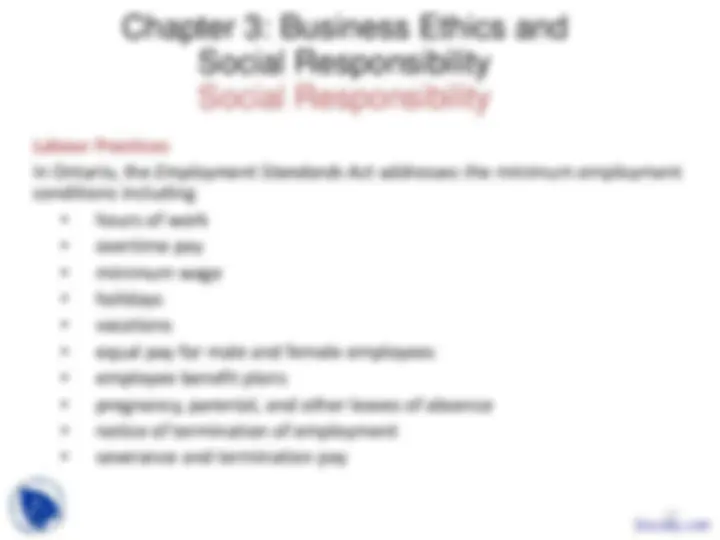
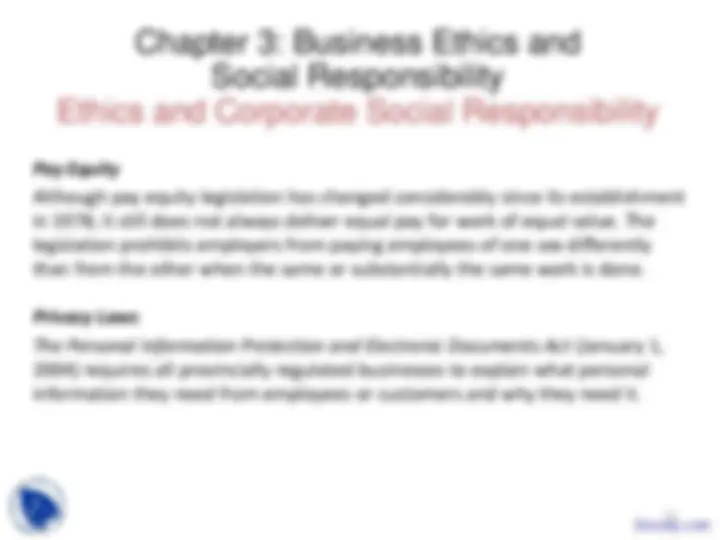
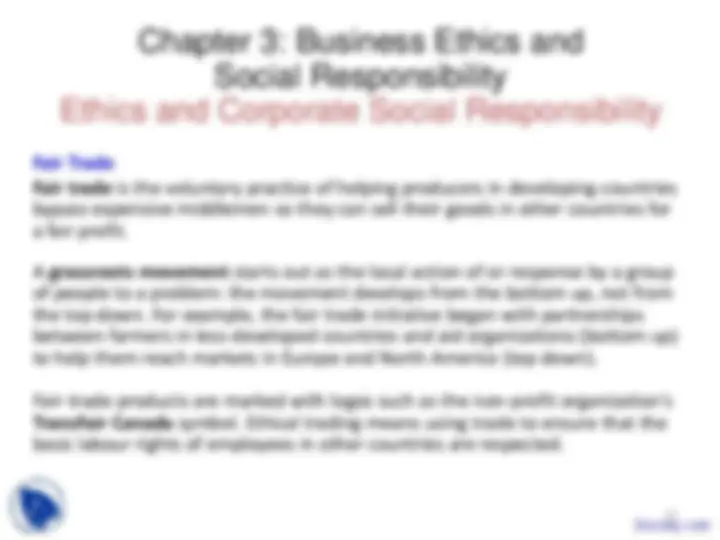


Study with the several resources on Docsity

Earn points by helping other students or get them with a premium plan


Prepare for your exams
Study with the several resources on Docsity

Earn points to download
Earn points by helping other students or get them with a premium plan
Community
Ask the community for help and clear up your study doubts
Discover the best universities in your country according to Docsity users
Free resources
Download our free guides on studying techniques, anxiety management strategies, and thesis advice from Docsity tutors
The concept of business ethics and social responsibility. It defines ethical behaviour, the role of ethics in business, and how businesses can resolve ethical dilemmas. The document also covers unethical business practices such as fraud, accounting scandals, and insider trading, and the importance of corporate social responsibility (csr). Csr principles, labour practices, and environmental responsibility are discussed.
Typology: Slides
1 / 15

This page cannot be seen from the preview
Don't miss anything!










Ethics are rules that help us tell the difference between right and wrong. They encourage us to do the right thing.
What is Ethical Behaviour?
Ethical behaviour is conduct that conforms to ethics—individual beliefs and social standards about what is right and good.
Values tell us what is important. They help us make decisions about right and wrong.
1
What Role Should Ethics Play in Business?
Business ethics are based on society’s ethics and those of the people who
work for and buy from them.
A Code of Ethics
Some companies write a code of ethics , a document that explains
specifically how employees should respond in certain situations.
Canadian laws address acceptable business behaviours. However,
businesses can still behave unethically without breaking these laws.
2
What Happens When People Do Not Behave Ethically?
When an individual acts unethically, his or her behaviour will most likely harm others. The individual could also be sent to jail for his or her actions. Major ethical issues include fraud, accounting scandals, and insider trading.
Fraud
Fraud is a crime of lying or pretending. Some businesses mislead consumers and trick them to buy their products or services. The Competition Act 2002 bans such fraud and deceptive business practices and defines these as
4
Accounting Scandals: Enron Click here for a link!
An accounting scandal occurs when accountants or senior executives alter accounting records for personal benefit.
Accounting information is used inside and outside of the business to make decisions. When accounting irregularities are uncovered, a forensic accountant investigates legal and financial documents to find evidence of tampering.
Embezzlement , a type of accounting fraud, happens when an accountant or senior executive creates false accounts and redirects money into them for personal gain.
Business owners rely on outside accountants, auditors , to check and report on the validity of financial records.
5
A business exhibits corporate social responsibility (CRS) through their values, ethics, and the contributions it makes to communities. CRS is driven by a desire to protect customers and to treat employees and shareholders fairly.
CSR Principles
Businesses that practice CSR principles support their employees and consumers by
7
8
Antidiscrimination Issues
Discrimination is denying a qualified individual an interview, job, or promotion based on his or her religion, gender, sexual orientation, or physical disabilities.
Gender discrimination is treating an employee differently based on their sex (male or female).
The glass ceiling refers to invisible barriers that may affect the career path of senior leaders in corporate positions.
Harassment
Many businesses have policies and procedures for dealing with harassment : behaviour that is threatening, disturbing, or makes others feel uncomfortable.
10
Accessibility Issues
The duty to accommodate refers to an employer’s obligation to ensure accessibility for all employees. The Canadian Human Rights Act, Sections 2 and 15, states that employees with disabilities must be accommodated by business as long as undue hardship does not occur to the business.
Environmental Responsibility
Environmental concerns for business include the Earth’s air, land, and water. These issues affect Canadian businesses and others in the world
Environmental Protection Act
The Canadian Environmental Protection Act 1999 was the response of Environment Canada to the environmental disaster of the Exxon Valdez.
Kyoto Protocol
Canada signed the Kyoto Protocol in 1998 that states countries must reduce carbon dioxide emissions by 2012 (five percent less than in 1990).
11
Social Responsibility
Social Responsibility
Labour Practices
In Ontario, the Employment Standards Act addresses the minimum employment conditions including
13
Social Responsibility
Ethics and Corporate Social Responsibility
Pay Equity
Although pay equity legislation has changed considerably since its establishment
in 1978, it still does not always deliver equal pay for work of equal value. The
legislation prohibits employers from paying employees of one sex differently
than from the other when the same or substantially the same work is done.
Privacy Laws
The Personal Information Protection and Electronic Documents Act (January 1,
information they need from employees or customers and why they need it.
14